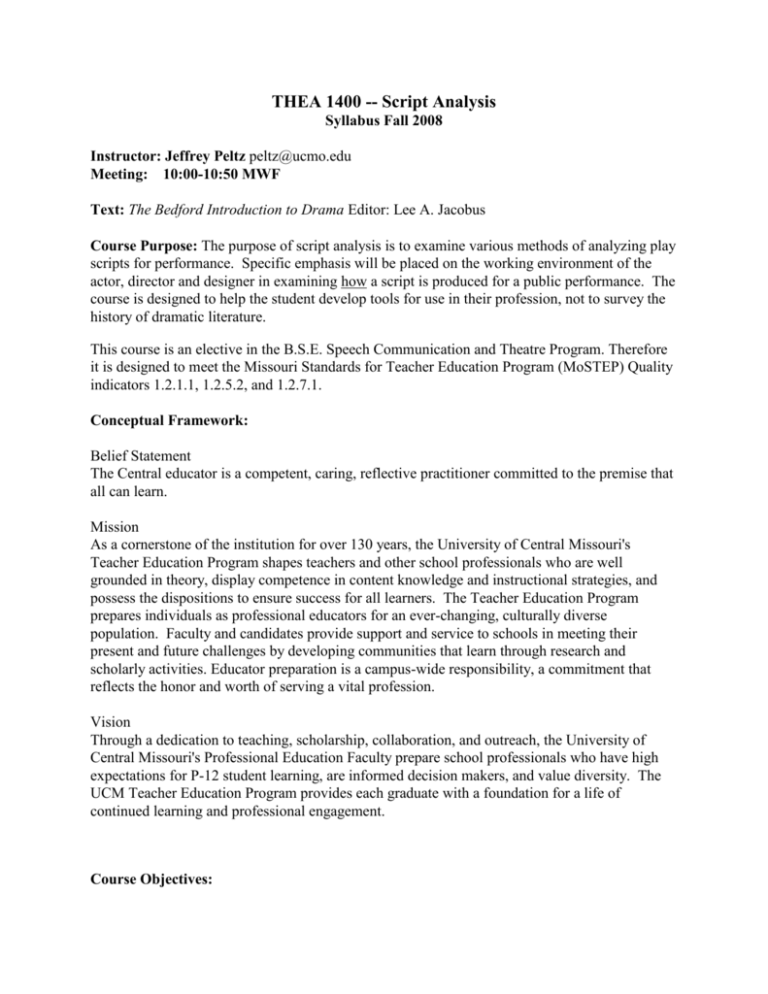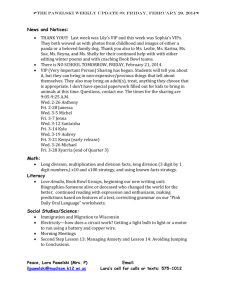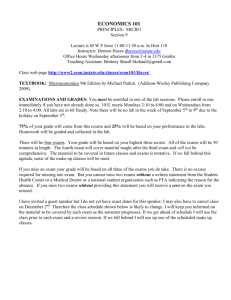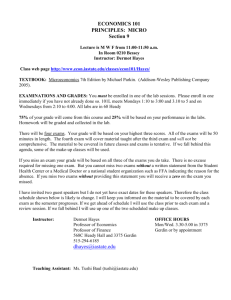THEA 1400 -- Script Analysis
advertisement

THEA 1400 -- Script Analysis Syllabus Fall 2008 Instructor: Jeffrey Peltz peltz@ucmo.edu Meeting: 10:00-10:50 MWF Text: The Bedford Introduction to Drama Editor: Lee A. Jacobus Course Purpose: The purpose of script analysis is to examine various methods of analyzing play scripts for performance. Specific emphasis will be placed on the working environment of the actor, director and designer in examining how a script is produced for a public performance. The course is designed to help the student develop tools for use in their profession, not to survey the history of dramatic literature. This course is an elective in the B.S.E. Speech Communication and Theatre Program. Therefore it is designed to meet the Missouri Standards for Teacher Education Program (MoSTEP) Quality indicators 1.2.1.1, 1.2.5.2, and 1.2.7.1. Conceptual Framework: Belief Statement The Central educator is a competent, caring, reflective practitioner committed to the premise that all can learn. Mission As a cornerstone of the institution for over 130 years, the University of Central Missouri's Teacher Education Program shapes teachers and other school professionals who are well grounded in theory, display competence in content knowledge and instructional strategies, and possess the dispositions to ensure success for all learners. The Teacher Education Program prepares individuals as professional educators for an ever-changing, culturally diverse population. Faculty and candidates provide support and service to schools in meeting their present and future challenges by developing communities that learn through research and scholarly activities. Educator preparation is a campus-wide responsibility, a commitment that reflects the honor and worth of serving a vital profession. Vision Through a dedication to teaching, scholarship, collaboration, and outreach, the University of Central Missouri's Professional Education Faculty prepare school professionals who have high expectations for P-12 student learning, are informed decision makers, and value diversity. The UCM Teacher Education Program provides each graduate with a foundation for a life of continued learning and professional engagement. Course Objectives: 1. To examine the various theories of tragedy and comedy and endeavor to apply them to major examples of dramatic literature drawn from various periods. (1.2.1.1) 2. To examine script analysis for the purpose of production. We will examine plays to understand not only “what” they “mean” but also “how” they “mean”. (1.2.1.1) 3. To explore problems in producing plays as well as possible production and performance styles. (1.2.1.1) 4. To discover and develop an effective methodology useful in script analysis. (1.2.1.1) 5. To examine the working environment of the actor, director, and designer in analyzing scripts. (1.2.1.1) Intended Student Outcomes: This course meets the following Theatre Department Student Outcomes: #1 The student should be able to communicate and collaborate effectively in the interactive and creative process of theatre. (1.2.1.1, 1.2.7.1) -Identify the common elements and vocabulary of theatre and of the interaction of these elements. -Think, speak, and write clearly in order to communicate one’s views effectively and rationally with members of the production team. #2 In preparation for careers within a global society, students should demonstrate a working knowledge of the historical, cultural and stylistic dimensions of drama and theatre.(1.2.1.1) -Identify and describe the major theatrical developments in various theatrical periods. -Recognize the structure, style, substance, language and historical importance of plays that are representative of the development of theatre and drama in world cultures. -Utilize the skills and techniques needed to conduct research into the culture, history, and style of a particular period or genre for the purpose of production. #3 Students should be able to utilize critical thinking skills in order to analyze and interpret a script for the purpose of developing a concept and systematic plan for the production of a play.(1.2.1.1) -Analyze scripts to develop visual and aural perceptions related to theatre performances. -State a theme and explain how that theme ties together the major events and actions of the play. -Analyze each character and the character’s relationship to all of the other characters and to the plot and theme. -Analyze the language characteristics of the script as they relate to character, rhythm, and style. -Analyze the structure, action, motivational units, and beats within the script. #4 Students should be able to form, communicate, and defend value judgments about quality and aesthetics in works of theatre.(1.2.1.1, 1.2.7.1) -Apply performance or production analysis to assess theatrical works of art. -Evaluate current critical thinking about theatre and other arts. -Communicate clearly in written or oral form; a response to an observed theatrical production. -Apply developing aesthetic values by attending academic and professional theatre and arts events. Course Methodology: The course will have a lecture/discussion format with heavy emphasis upon discussion. You will be called upon during almost every class to contribute, so be absolutely certain you keep up with the reading. Attendance: Attendance is required. Each absence over three will result in a 5 point grade reduction. Failure to hand in an assignment on the assigned day will result in a zero on that assignment. You will be required to attend one Studio production and two Mainstage productions (Joseph and the Amazing Technicolor Dreamcoat and Some Assembly Required. Course Requirements: 1. 2. 3. 4. 5. The student will be responsible for reading 9 play scripts throughout the semester. It is essential that the student is well prepared in their reading and ready to discuss the plays on the assigned days. You should bring your scripts to class for each session. The student will be responsible for writing a micro theme for each play discussed. A micro theme should be two pages long, typed, and double spaced. These papers will serve to discuss the tools of analysis we are focusing on. The student will be required to attend one Studio Theatre production, Joseph and the Amazing Technicolor Dreamcoat and Some Assembly Required. The student will participate in classroom oral discussions on assigned topics. Examinations: There will be a mid-term examination and a final examination. The student will be tested on their ability to apply theories to plays, to identify dramatic concepts and to recognize characters and details from the plays they have read. Daily Assignments: There will be periodic daily assignments throughout the semester. Evaluation: Playwright assignment: 10pts. Micro Themes (9@20pts. ea.)180pts. Class Discussion 75pts. Mid-Term Exam Final Exam TOTAL POINTS 415-373=A 289-249=D 372-332=B 331-290=C 50pts. 100pts. 415pts. 248-0=F CALENDAR Wed. Aug. 25 Fri. Aug. 27 Introduction and challenges to the course Locating Scripts (Tour of the James Kirkpatrick Library) Mon. Aug. 30 Wed. Sept. 1 Fri. Sept. 3 Mon. Sept. 6 Wed. Sept. 8 Fri. Sept. 10 Mon. Sept. 13 Wed. Sept. 15 Fri. Sept. 17 Mon. Sept. 20 Wed. Sept. 22 Fri. Sept. 24 Mon. Sept. 27 Wed. Sept. 29 Fri. Oct. 1 Mon. Oct. 4 Wed. Oct. 6 Fri. Oct. 8 Mon. Oct. 11 Wed. Oct. 13 Fri. Oct. 15 Mon. Oct. 18 Wed. Oct. 20 Fri. Oct. 22 Mon. Oct. 25 Wed. Oct. 27 Fri. Oct. 29 Mon. Nov. 1 Wed. Nov. 3 Fri. Nov. 5 Mon. Nov. 8 Wed. Nov. 10 Fri. Nov. 12 Mon. Nov. 15 Wed. Nov. 17 Fri. Nov. 19 Mon. Nov. 22 Wed. Nov. 24 Fri. Nov. 26 Mon. Nov. 29 Wed. Dec. 1 Fri. Dec. 3 Mon. Dec. 6 Wed. Dec. 8 Fri. Dec. 10 Beginnings of Analysis (Assignment Due) A Raisin in the Sun A Raisin in the Sun NO CLASS -- LABOR DAY A Raisin in the Sun Micro Theme #1 Due Death of a Salesman Death of a Salesman Death of a Salesman Micro Theme #2 Due/Discussion of Studio Theatre Aristotle’s Poetics NO CLASS -- STAM CONVENTION Medea Medea Medea Micro Theme #3 Due Shakespeare Shakespeare and Hamlet Discussion of Joseph. . .Dreamcoat. Continue with Hamlet Hamlet DISTRICT TEACHER’S MEETING--NO CLASS Hamlet/Review for Midterm Examination MID-TERM EXAMINATION Comedy and The Way of the World--Micro Theme #4 Due The Way of the World The Way of the World The Way of the World Micro Theme #5 Due Realism and Hedda Gabler Hedda Gabler Hedda Gabler/Discuss Children’s Show Hedda Gabler Micro Theme #6 Due Bertolt Brecht and Mother Courage Mother Courage Mother Courage MASTER HAROLD. . .and the boys Micro Theme #7 Due NO CLASS -- Thanksgiving Vacation NO CLASS -- Thanksgiving Vacation MASTER HAROLD. . .and the boys MASTER HAROLD. . .and the boys Micro Theme #8 Due Oleanna Oleanna Oleanna Final Exam Review/Micro Theme #9 Due/Discussion Some Assembly. . . Wed. Dec. 15 FINAL EXAM: 8:00-10:00am.







